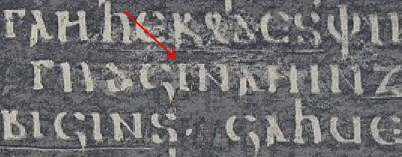In Luke 1:5 Wulfila.be’s text reads “… gudja namin Zakarias …”. Doesn’t it look like it should be “… gudji namin Zakarias …”, however? (They do note that the text is ‘partially normalized’.)

Benzelius also transcribes “gudji”. In other places this /i/ occurs in the words gudjinon ‘serve as priest’ a few verses later in Luke, and gudjinassus ‘priestly office’ at Luke 1:9 and 2 Corinthians 9:12. So this might be another split word which I couldn’t find by searching digitized texts. On the other hand, the difference between gudja and gudji is so slight that a scribe might well use the form he or she is used to.
In A Comparative Germanic Grammar Eduard Prokosch (or perhaps his editor Bolling) sums up the underlying grammar nicely:
81§
In Germanic all ā-stems are feminines, but elsewhere also masculines occur, denoting types of human beings, e.g., L. scrība, poeta, agricola, OSl. sluga ‘servant’, vojevoda ‘army leader’, Gk. νεανίας ‘youth’.
[…]
B. jā-Stems.
[…]
In Germanic, we find the endings -jā and -ī. Gothic and Old Norse use the former with short stems, the latter with long stems: Go. banja ‘wound’, sibja ‘relationship’, halja ‘hell’, but bandi ‘band’, þiudan-gardi ‘kingdom’, þūsundi ‘thousand’ […]
Balg suggests the word formation as: “from stem of guþs and suff. -jan”. He gives the gender as masculine. Are there any more Gothic masculine words ending in -a? Yesh!
aba ‘husband’ (Irregular in the plural, according to Lambdin 6.1 (p20))
abba ‘father’
afdrugkja ‘drunkard’
aha ‘mind’
ahma ‘spirit’
aiwaggelista ‘evangelist’ (Balg: from L. evangelista)
aldoma ‘old age’ (Only occurring in Luke chapter 1)
allawaurstwa ‘one who works with all his might, perfect’ (Only occurring in Colossians 4:12)
ara ‘eagle’ (Only occurring in Luke 17:37)
atta ‘father’
bandja ‘one being bound’
… and so on.
Lambdin notes for weak nouns that -n remains in all cases and numbers except nominative, so they would have, originally, had stems ending in -n.
I’d point out that aba, abba and atta might be onomatopoetic, originally used by a small child not knowing about cases, and that the case endings for weak nouns contain sequences with prepositional character, namely -in and -an, with the sense of ‘in’ and ‘against/on’, thus expressing the functions of the dative and accusative cases respectively.
Nom: atta
Dat: attin
Acc: attan
Well, well.
In Luke 15:25, the prodigal son’s brother “qimands atiddja neƕ razn”. Me thinks a continental Goth would say and write “qimands atiddja neƕa razn”. What do you think?





